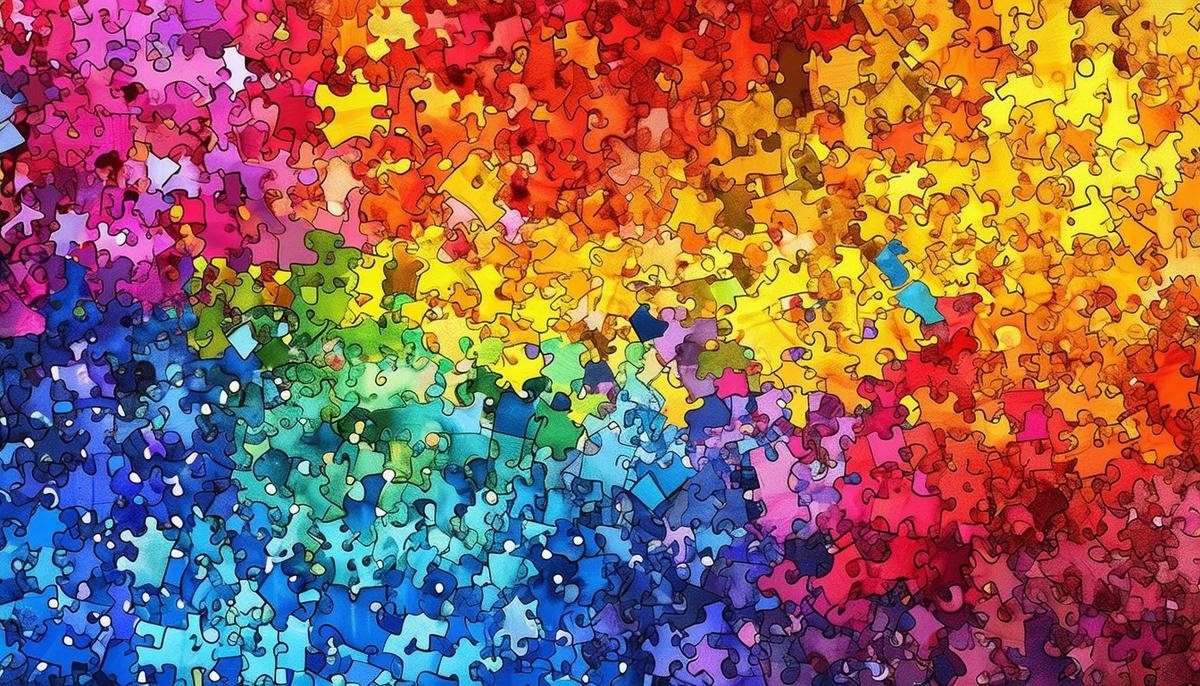
Autism and Obsessive Compulsive Disorder, commonly known as OCD, are multifaceted, commonly misunderstood, and complex conditions. Autism, a developmental disorder, impacts social interactions and communication while OCD, an anxiety disorder, manifests as recurring and uncontrollable thoughts or behaviors. Understanding these mental health conditions is not exclusively needed by clinicians and professionals but also by the general public, considering their prevalence in today’s society. This discourse provides an in-depth exploration of Autism and OCD, their interconnectedness, the impact on families, as well as strategies to efficiently navigate through daily life and the resources available for support. The objective is to ensure we promote a world that is more informed, compassionate, inclusive, and supportive of individuals bearing these conditions.
Understanding Autism and OCD
Shedding Light on Autism and Obsessive-Compulsive Disorder
Whether you’re a new parent or well-seasoned into the journey, it’s crucial that we understand different mental health conditions that may affect our children. Today, we delve into the world of Autism and Obsessive-Compulsive Disorder, commonly known as OCD.
Autism, also known as Autism Spectrum Disorder (ASD), is a developmental condition that affects a person’s social interaction, communication, and behavioral patterns. There is an extensive range of symptoms, and each person with autism may present differently — hence the use of the term “spectrum.”
Children with autism often show signs as early as 18 months of age. Some key indicators include delayed speech development, difficulties with eye contact or establishing social connections, and repetitive behaviors. Remember, early intervention is key to enhancing their life quality and helping them adapt better.
Meanwhile, Obsessive-Compulsive Disorder, or OCD, is a mental health disorder characterized by recurring, unwanted thoughts, or “obsessions” and repetitive behaviors, or “compulsions”. These obsessive thoughts and compulsive behaviors can be intensely distressing and time-consuming, interfering with a person’s daily activities and social interactions.
Someone with OCD might ritualistically wash hands, check the stove or lock doors multiple times fearing contamination, fire, or theft. It’s important to note that OCD isn’t about being orderly or perfectionistic; it’s much more invasive and can be quite incapacitating.
An important revelation is that these disorders are not as rare as one might imagine. In fact, autism affects 1 in 54 children, while OCD affects 1 in 100 children. That being said, diagnosis is not a deterrent to a wholesome, thriving life. Plenty of individuals with autism and OCD lead fulfilling lives filled with love, joy, and accomplishments.
Understanding the intricacies of conditions like autism and OCD helps us be better equipped as parents, educators, and community members to provide support and empathy. If a loved one is showing signs of either condition, it is advised to consult with a medical professional for a comprehensive assessment.
Recognizing and addressing these conditions doesn’t always come easy, but as a community, we can inject understanding and compassion into every step of the journey. Let’s embrace inclusivity and celebrate the unique threads that weave into the beautiful fabric of our diverse community. Remember, every step forward contributes to a more understanding and empathetic world for our children.

Understanding the connection between Autism and OCD
Now that we’ve introduced Autism Spectrum Disorder (ASD) and Obsessive-Compulsive Disorder (OCD), let’s delve into the potential link between these two complex conditions. It’s common to ponder if there could be a connection, particularly when we consider the overlapping behaviors, such as repetitive actions or strong preferences for routine.
Scientific research indicates think there may be a connection between the two conditions. Studies have found that nearly 17% to 37% of individuals on the autism spectrum also present OCD symptoms, much higher than the 1% to 2% prevalence of OCD in the general population. Still, there’s plenty more research to be done to fully understand this challenging terrain.
Autism and OCD can manifest distinct yet intertwined symptoms. Individuals with autism might demonstrate rigid adherence to routines or ritualized patterns, which could be mistaken as obsessive or compulsive behavior. Meanwhile, a child with OCD might exhibit similar tendencies but driven by intense and intrusive thoughts.
A vital clarification is that the motivation behind these behaviors in ASD and OCD differ. Children with autism often find comfort and predictability in routines, while those with OCD perform rituals driven by the urge to alleviate anxiety or prevent an imagined disaster. Distinguishing the root cause of these behaviors can guide us towards appropriate support strategies.
Therapy techniques used for OCD, such as Cognitive-Behavioral Therapy (CBT) or Exposure and Response Prevention (ERP), can aid in managing obsessive thoughts and compulsive actions. Likewise, interventions for autism, such as Speech Therapy, Occupational Therapy, or Applied Behavior Analysis (ABA) helps enhance communication, social skills, and adaptive behaviors.
It’s important to remember that treatment plans should be tailored to the individual’s unique needs. What works for one child may not work for another. Patience, understanding, and empathy remain invaluable throughout this therapeutic journey.
While not every child with autism will experience OCD, and vice versa, understanding the potential connection gives us a broader perspective. Acknowledging their distinctive yet intertwining features helps bring light to the appropriate support needed for our children. It’s our duty to ensure that they are not simply defined by their diagnosis but celebrated for their unique strengths and capabilities.
Remember, it’s okay to ask for help, and it’s okay to take our time in navigating the path of parenting a child with ASD or OCD. Reach out to community resources, family, and friends. We’re all in this together, nurturing our children’s growth and celebrating their triumphs, no matter how small, every step of the way.

The Impact on the Family and Siblings
Transitioning to Family Life with Autism and Obsessive-Compulsive Disorder
Creating a supportive environment for children with Autism Spectrum Disorder (ASD) and Obsessive-Compulsive Disorder (OCD) is of utmost importance for their development and well-being. It’s through dedicated understanding and empathy that families can truly appreciate the unique traits of their loved ones on these spectrums.
Having taken an overview of what ASD and OCD are, their prevalence rates, symptoms, and the need for professional intervention, let’s delve into the effects these conditions can have on the dynamics within families, especially among siblings.
Finding Their Footing in the Family Structure
The presence of developmental disorders can influence the structures and routines of the family. This could mean adapting to different ways to communicate, ensuring the environment is less stressful, and supporting siblings who might experience feelings of confusion or frustration. That being said, children are incredibly adaptive. They can learn to understand and beautifully bond with their siblings on these unique spectrums.
Addressing Siblings’ Concerns
Every child’s perception and reaction will vary in a family where a sibling has ASD or OCD. Some may display empathy from the start, while others may grapple with fear, concern, or feelings of neglect. Open communication is essential. Engage in honest discussions about their sibling’s conditions, quell their concerns, and promote a shared sense of responsibility. Encourage dialogue and questions to further their understanding.
Building Empathy Among Siblings
Children are innately empathetic. Harness this trait by fostering an understanding of the experiences their sibling with ASD or OCD goes through. Encourage them to accompany their sibling to therapies, engage in mutual activities, and teach them about the coping mechanisms their brother or sister employs. Seeing the world through a different lens will cultivate a deep-seated empathy and an unshakeable bond between siblings.
Unveiling The Silver Lining
Every cloud has a silver lining, and every child has unique strengths. This mantra extends to children with ASD and OCD. Encourage siblings to celebrate these strengths, whether it be their autistic brother’s keen focus or their OCD sibling’s unique orderliness. Encourage siblings to work together on puzzles, games, or activities that play to these strengths. In doing so, a message is reinforced: every individual is unique, diverse, and universally valued.
Building Resilience in the Family
It’s only natural that parenting a child with ASD or OCD may present its unique challenges. Feelings of stress, guilt, or exhaustion might creep in at times. It’s important to normalize these feelings and seek external support. Reach out to friends, family, or professional resources who can lend a much-needed hand or ear. You’re not alone in this, and sharing the burden can fortify the family’s resilience.
At the heart of it all, positive family dynamics can be fostered through patience, understanding, and celebration amidst adversity. No journey comes without its road bumps, but it’s these bumps that often lead us down an enlightening path to growth, resilience, and an endless reservoir of love. In the end, they’re not merely families raising a child with ASD or OCD; they’re championing, nurturing, and celebrating the uniqueness of every family member. Happy parenting!

Navigating through Daily Life
When it comes to managing the daily routines of children with Autism Spectrum Disorder (ASD) and Obsessive-Compulsive Disorder (OCD), there are several strategies that can help. Shaping your household routine in a manner that accommodates the specific needs and behaviors of your child will lead to a more harmonious and supportive environment. And remember, you’re not alone. There are numerous resources that can provide support, guidance, and insight.
The first step is to have a consistent daily routine. This repetitive structure is crucial in ensuring stability and comfort for children with ASD or OCD, as unpredictability can invoke stress and exacerbation of symptoms. So, try to maintain regular meal times, bedtime, and other daily activities. It doesn’t have to be a strict time table, but a consistent order of events can prove highly beneficial.
It’s also important to implement regular exercise in your child’s routine, as it’s proven to reduce symptoms of both ASD and OCD. This doesn’t necessarily mean rigorous workouts. Any physical activity, such as bike riding or even just a simple walk, can go a long way in managing these conditions.
We also cannot stress the importance of downtime enough. Ensure that your child has a quiet, personal space where they can process their day and unwind. This private area should be decorated with items that help them feel calm and happy.
When dealing with undesirable behaviors, avoid punishing your child directly. Instead, focus on constructive discipline, like withholding privileges or implementing timeouts. Keep instructions clear, concise, and be sure to praise good behavior as often as possible.
Visual schedules, as well, can be helpful for children with ASD or OCD. A visual depiction of the day’s activities can aid your child in understanding what’s expected of them, lessening possible distress about unknowns. Remember to include calming activities throughout the day to reduce anxiety levels.
Lastly, the use of social stories can be highly beneficial. These are tailored tales that explain social situations and concepts in a way your child can understand. You can create your own or find resources available online that employ this tactic.
While managing the daily routine of a child with ASD or OCD can be challenging, it also offers an opportunity for growth and understanding within the family. The experiences shared will not only help your child become more resilient but will also deepen the bond within your family, turning adversity into strength.
Please note that these strategies are suggestions and may not be suitable for all children with ASD or OCD. Each child is uniquely different with different needs and preferences. Always consult a healthcare provider for personalized strategies and interventions.
Every child’s journey is a story filled with chapters of struggle and triumph. As we help our children navigate the complexities of ASD and OCD, it’s essential to remember this journey is also filled with love, understanding, and growth. Everyone involved learns to face challenges and discovers strengths they never knew existed. And through it all, we celebrate the beautiful diversity that makes up our homes and our world.

Support and Resources
Now, let’s delve into the specifics about support and resources that are available to help families navigate the waters of Autism Spectrum Disorder (ASD) and Obsessive-Compulsive Disorder (OCD). Remember, every family’s journey will be unique, and it’s essential to not compare yourself or your child to others. You’re doing the best you can, and so is your precious little one.
For children with autism and OCD, there are several forms of clinical therapy available that can prove helpful. Cognitive-behavioral therapy (CBT), for example, is one of the most effective for OCD and is increasingly being adopted for those with ASD. This supportive therapy empowers a child to acknowledge and understand their thoughts, feelings, and behaviors, and helps in developing coping strategies.
Other therapies that could be beneficial include occupational therapy, physiotherapy, speech and language therapy, and therapeutic recreational programs. It’s crucial to trust in these professionals as they help you and your child. They can recommend individualized strategies and interventions, breaking tasks into more manageable components, and helping your child to feel more comfortable, understood, and supported in their day-to-day life.
Another invaluable tool is support groups. Connecting with local and online support groups provides a community that understands your journey. They offer a place to share experiences, learn from others, find encouragement, and realize you’re not alone. Look for groups specifically tailored to families dealing with ASD or OCD. Non-profit organizations like Autism Speaks, the International OCD Foundation, and the National Autism Association can help connect you with resources and local support groups.
Moreover, educational resources play an integral role in supporting children with these conditions. Schools with special education programs, as well as mainstream schools with inclusive policies and knowledgeable staff, could significantly benefit your child. Additionally, various online platforms provide educational tools, like apps and interactive websites, specifically designed to cater to children with ASD and OCD.
For family support, consider involving a social worker or seeking out a family therapist specializing in ASD and OCD. They can provide strategies to manage day-to-day stress, assist in navigating healthcare systems and services, and support the family during challenging times.
Inclusion in community activities is also essential for social skill development. Look for inclusive classes, sports teams, or social opportunities that your child can participate in. This inclusion gives them a sense of belonging and acceptance, enhancing their self-esteem and emotional well-being.
Lastly, remember to take care of yourself. Parenting a child with ASD or OCD comes with challenges that can sometimes feel overwhelming. Ensuring your well-being—both physically and emotionally—is crucial so you can effectively support your child. Self-care looks different for everyone, so find what works for you, whether it’s reading a book, doing yoga, having coffee with friends, or simply taking a quiet walk.
Supporting a child with ASD or OCD can feel like a winding journey with both highs and lows, but remember, every step is progress, even if it doesn’t always seem like it. And along the way, you’ll see the beautiful strengths of your child shining through—the creativity, the focus, the wonderful uniqueness. Embrace those moments.
Though the challenges of ASD and OCD can feel daunting, know that there are comprehensive and meaningful resources to help your family. A combination of professional help, community support, educational tools, and practices at home can make all the difference. And always remember the love, patience, and understanding you provide your child with are the most meaningful support of all.

Overall, while Autism and OCD may pose significant challenges, acknowledging and understanding them is a pivotal first step towards better management and creating an inclusive environment. The influence on the families is profound, and thus, they are not to be neglected. Their struggles are real, but with the right strategies, support, and resources, navigating through life can be made smoother. Knowledge about these conditions can indeed empower families, friends, educators, and society as a whole. As a community, it is our responsibility to extend support and understanding to individuals and families affected by Autism and OCD, fostering a more accepting, informed, and emphatic society.




